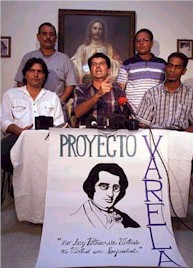 Reform
activist says massive march shows government's fear of reform referendum
Reform
activist says massive march shows government's fear of reform referendumAssociated Press , June 13, 2002 Thursday 2:44 AM Eastern Time
By ANITA SNOW; Associated Press Writer
HAVANA-Fidel Castro's mobilization of millions of people to ratify Cuba's one-party socialist system as "untouchable" has organizers of a reform movement convinced their project has terrified the government.
"We are filled with hope," said Oswaldo Paya, top organizer of the Varela Project referendum. "It was the desperate mobilization of a government that feels panicked. If the government feels so sure that it has the support of the people, then why not have the referendum?" Described as the nation's response to President George W. Bush's May 20 Cuba policy speeches, the marches here and around the island Wednesday also supported a proposed constitutional amendment declaring that Cuba's economic, political and social systems cannot be changed.
Surrounded by security men and other top communist officials, Castro, who celebrates his 76th birthday in August, walked slowly down the Malecon coastal boulevard for about a mile (1.6 kilometers), then stood on a stage for hours afterward watching marchers pass by.
Wearing his traditional olive green uniform and cap and the black high-top athletic shoes he now favors, Castro waved a small red, white and blue Cuban flag as the sea of people marched toward the U.S. Interests Section, the American mission in Havana.
"Long live socialism! Down with the lies!" Castro shouted - referring to Bush's speeches promising not to lift American trade and travel restrictions until Cuba holds competitive elections and undertakes other democratic reforms.
The Havana event coincided with about 800 marches around the island involving several million of the nation's 11 million citizens, the government said. The government said 1.2 million people - more than half the capital's population - participated in Havana alone.
Paya said he watched part of the march, which was shown live on state television and then repeated for viewers in the late afternoon.
"In the street with their little flag, the people cannot say anything," said Paya, a longtime activist with Cuba's Christian Liberation Movement. "Thousands of those people marching in front of the Interests Section are signed up there for the (visa) lottery to go to the United States."
Castro called for the mobilization to support the proposed constitutional change, announced one month to the day after Paya and other activists submitted more than 11,000 signatures to the National Assembly soliciting a referendum.
The Varela Project initiative would ask voters if they favor civil liberties including freedom of speech and assembly, the right to own a business, electoral reform and amnesty for political prisoners.
Most Cubans first heard of the Varela Project in mid-May, when former President Jimmy Carter mentioned it in a live, uncensored television address to the Cuban people. Carter suggested that the plan be published in the state media. But that has not happened, and most Cubans still do not know what it says.
Castro has said nothing publicly about the Varela Project. But the proposal to describe the socialist system as "untouchable" in the constitution indicates that the current leadership is not in the mood for change.
In comments to international media, communist officials have accused Varela Project organizers of being on the U.S. government payroll - something the activists deny. Authorities also have described what they say are legal and technical problems with the referendum proposal, giving it little hope for success.
"If Castro is serious about his constitution, he would hold a referendum on reforms outlined in the Varela Project," said U.S. Rep. Jeff Flake, a member of the House International Relations Committee and of the newly formed House Cuba Working Group, which favors easing sanctions against the island.
Flake, who spoke in Washington, is chief Republican co-sponsor of a House resolution that praises Cubans who signed the Varela Project. The Senate unanimously passed the resolution Monday.
Paya said Varela Project organizers welcomed the Senate resolution, calling it "a demonstration of respect for the self-determination of the Cuban people."
Copyright 2002 Associated Press